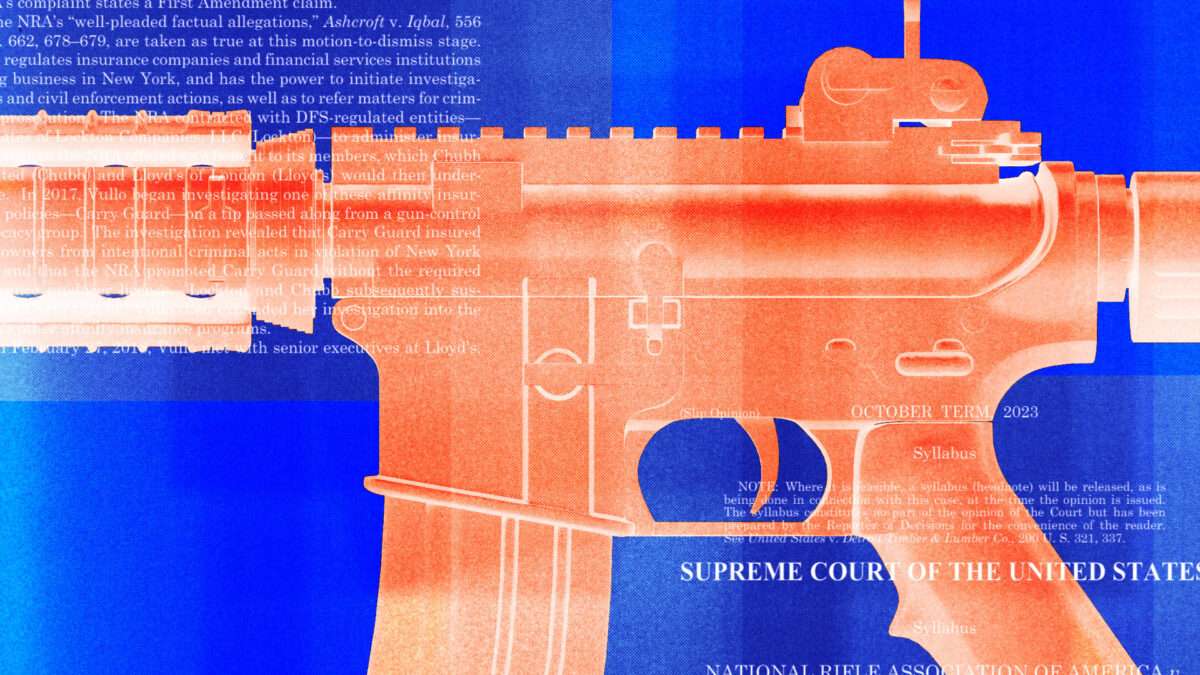The NRA's Unanimous Supreme Court Victory Is Good for Free Speech—No Matter How You Feel About Guns

What do the National Rifle Association (NRA), the American Civil Liberties Union (ACLU), and nine U.S. Supreme Court justices from five presidential administrations all have in common? That list is likely relatively small. But at least one area of overlap was made evident Thursday when the Court published a unanimous ruling that a New York government official allegedly violated the First Amendment by pressuring insurers and banks to sever business ties with the NRA, which the ACLU is representing.
The decision resuscitates the gun advocacy group's lawsuit against Maria Vullo, the former head of New York's Department of Financial Services (DFS). The U.S. Court of Appeals for the 2nd Circuit had previously ruled in her favor.
At the core of the case is Vullo's advocacy following the 2018 shooting at Marjory Stoneman Douglas High School in Parkland, Florida. After that tragedy, in private meetings with insurance companies, Vullo allegedly expressed she would selectively apply enforcement action to groups that insisted on serving the NRA.
She didn't stop there. She also sent letters titled "Guidance on Risk Management Relating to the NRA and Similar Gun Promotion Organizations" to insurers and banks, in which she encouraged them to "continue evaluating and managing their risks, including reputational risks, that may arise from their dealings with the NRA or similar gun promotion organizations"; to "review any relationships they have with the NRA or similar gun promotion organizations"; and to "take prompt actions to manag[e] these risks and promote public health and safety." And in a press release with then-Gov. Andrew Cuomo, the two officials urged such companies to terminate their relationships with the gun advocacy group. Some took them up on the suggestion.
The constitutional issue at stake here is similar to the one the Court explored in Murthy v. Missouri, the case that asks if President Joe Biden's administration violated the First Amendment when it sought to convince social media companies to remove content it disliked. During those oral arguments in March, many justices appeared sympathetic to the view that government officials had not overstepped the bounds of their authority and had merely exercised their own free speech rights to persuade those companies to adopt their views, not unlike a White House press secretary promoting an ideological slant to the media.
But in NRA v. Vullo, the Court ruled unanimously that Vullo's actions as alleged by the NRA had crossed the line from persuasion into coercion. "Government officials cannot attempt to coerce private parties in order to punish or suppress views that the government disfavors," wrote Justice Sonia Sotomayor. The NRA, she said, "plausibly alleges that respondent Maria Vullo did just that."
The decision sends the case back to the 2nd Circuit, which could still give Vullo qualified immunity, the legal doctrine that shields government officials from suits like the NRA's if the misconduct alleged has not been "clearly established" in prior case law. That outcome is certainly probable, as the 2nd Circuit's original decision not only ruled that Vullo had not violated the Constitution—which the Supreme Court rejected today—but that even if she had, qualified immunity would insulate her from the NRA's claim.
It is difficult to imagine, however, a more obvious violation of the Constitution than the weaponization of government power to cripple advocacy disfavored by the state. The supposed reason for qualified immunity is that taxpayer-funded civil servants deserve fair notice that conduct is unlawful before a victim can seek recourse for those misdeeds. To argue that a government agent could not be expected to understand the contours of the First Amendment here is rather dire.
Many people may struggle to separate the constitutional question from the ideological backdrop. The NRA, after all, is one of the more polarizing lobbying organizations in the country, not least of which because its founding issue—gun rights—is not exactly a topic that elicits cool-headed responses. It has also become an advocacy group not just for firearms but for the Republican Party more broadly and the identity politics associated with it, alienating large swaths of people, to put it mildly.
There is another major group in the country that has followed a similar story arc, just on the other side of the political spectrum: the ACLU. Once a stalwart free speech group—so principled it defended the First Amendment rights of Nazis—it has, in modern times, sometimes actively advocated against civil liberties when those principles transgress progressive politics, an awkward move when considering the group's name. But no matter how much you dislike one or both of them, the NRA and the ACLU coming together here is all the more reflective of the fact that some things, like the First Amendment, really aren't partisan.
The post The NRA's Unanimous Supreme Court Victory Is Good for Free Speech—No Matter How You Feel About Guns appeared first on Reason.com.


